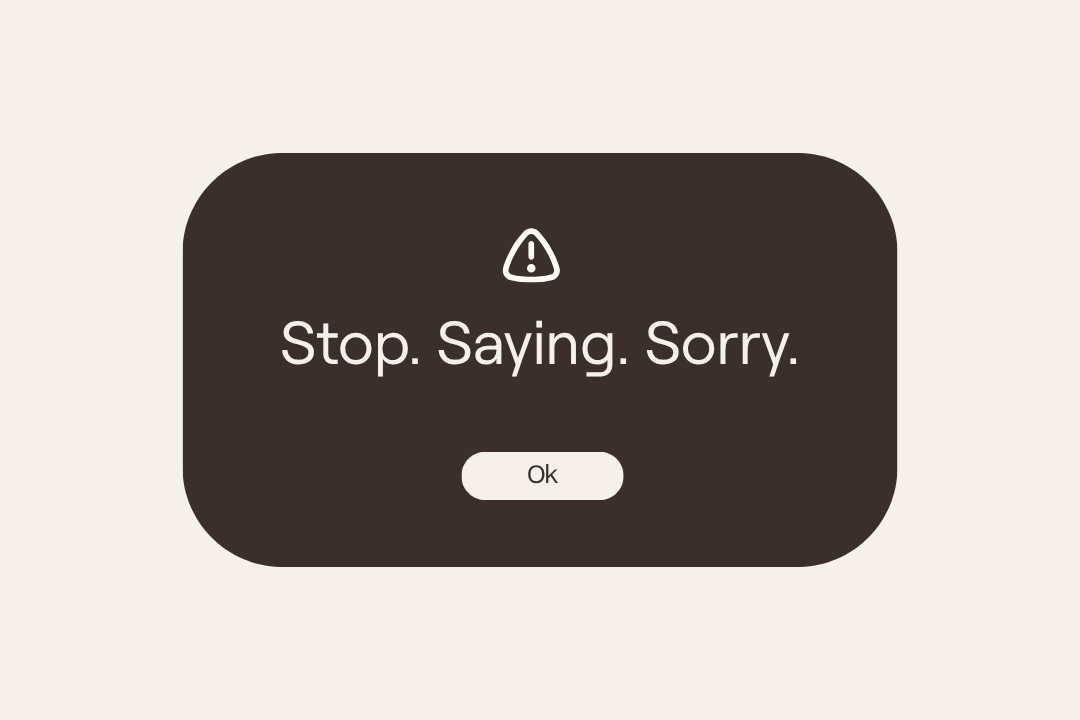Sorry - Not Sorry
The myth that saying sorry fixes anything
Let’s be honest: most apologies are fake. They’re social etiquette, not emotional repair. They’re the verbal equivalent of tossing a Band-Aid on a bullet wound.
We say “sorry” like it’s a reflex:
“Sorry I’m late.”
“Sorry to bother you.”
“Sorry, I’ll do better.”
If the apology isn’t backed by real change or genuine remorse, it’s meaningless. Your nervous system knows it, your brain feels it, and your relationships are paying the price.
Wanting to apologise is fine. Seeing someone hurt because of something you did and wanting to help them feel better—that’s human. But ask yourself: who are you really trying to soothe? And for how long?
Most of the time, that “sorry” is a shortcut. It’s cheap. It’s a meaningless jumble of words. Sure, sometimes saying it is hard—but hard or not, words alone don’t fix anything.
Let’s break it down and unpack some of the lies we tell ourselves about apologies.
The Lies we tell ourselves
Lie #1: “Saying sorry shows strength”
Wrong. It shows avoidance.
When you apologise to dodge conflict, smooth over guilt, or keep someone quiet, it’s not strength - it’s self-protection.
A genuine apology can actually calm both parties' nervous system. It signals safety, lowers threat responses, and opens the door to repair. A hollow apology? It does the opposite. Our brains are wired to notice when words don’t match actions. We stay on high alert. Nervous system slammed and trust - definitely not!
Bottom line: if your “sorry” isn’t backed up with real action, you’re not repairing anything - you’re just managing appearances and causing confusion to the nervous system.
Lie #2: “Sorry can make up for everything”
Also wrong. Repeated research in behavioural science and relational psychology shows that trust is rebuilt through consistent behaviour, not polite words. Hollow apologies can even erode trust, because they’re perceived as manipulative. Saying sorry without change is literally teaching your partner’s brain: expect harm, not repair.
Lie #3: “I only need to apologise for what I did wrong”
Nope. Intent doesn’t cut it. The brain doesn’t care that you “meant well” - it feels the impact. Even if you didn’t mean to hurt someone, the amygdala responds to the perceived threat. Acknowledge the effect, not just your intent- otherwise, their nervous system stays defensive, and trust doesn’t rebuild.
Lie #4: “Saying sorry is admitting weakness”
Wrong. The whole point of an apology isn’t about proving anything about you. It’s about dropping the ego and showing up with humility.
The ego hates apologising because it feels exposed. A genuine apology isn’t about shrinking- it’s about stepping up. It says, I value this connection more than my ego. That’s strength, not shame.
PS in practice
Real-Life Example: Dave and Claire
Dave booked a high-stakes meeting during Claire’s work hours. He knew it would trigger her core wound: “You never value what I do.”
When she blew up, he said: “I’m sorry, I didn’t think.”
Except he did think. He chose the meeting. The apology wasn’t remorse - it was avoidance.
Here’s what he could’ve said instead:
“Yes, this meeting is high stakes and I booked it, which I know impacts you. I hate that this triggers your wound of not feeling valued. I don’t regret the decision, but I want to talk about what this means for us.”
That’s accountability. That’s repair. That’s real.
——
The Science of Real Repair
Saying “sorry” isn’t enough. Repair demands alignment: what you did, how you feel, and what you do next.
1. Own the impact – Call it out clearly: “I did X, and I see how that hurt you.” Not, “I’m sorry you felt hurt.”
2. Match your emotion – Your tone, body language, and presence need to match your words. Our brains detect insincerity immediately.
3. Change your behaviour – Words don’t rebuild trust. Consistent action does. Miss one of these, and that “sorry” is just noise.
The PS Point
Next time you’re about to say “sorry,” ask yourself:
Am I patching my ego or repairing the connection?
Am I hiding from discomfort or facing it?
Do I genuinely regret this action (or its impact) - or am I avoiding consequence?
Yes: Own it, express real remorse, and commit to change.
No: Don’t fake it. Instead say: “I don’t regret my action, but I see it hurt you. Let’s talk about why, and how we can stay connected despite it.”
Actions speak louder than words. If you’re not ready to change, keep your “sorry” to yourself. Because if sorry alone healed wounds, we’d all be whole by now.
WANT TO KNOW MORE?
Book:
Why Won’t You Apologize? by Harriet Lerner
Jordan B Peterson - The art of a sincere apology
Esther Perel - The power of an apology
Andrew Huberman | Esther Perel - How to Find, Build & Maintain Healthy Romantic Relationships
Need help apologising?
Let’s break the loop and turn empty words into lasting change.

